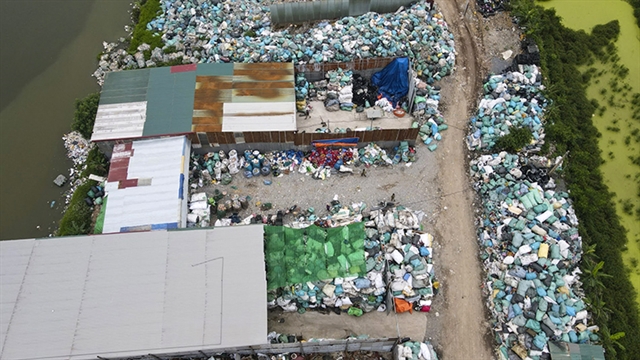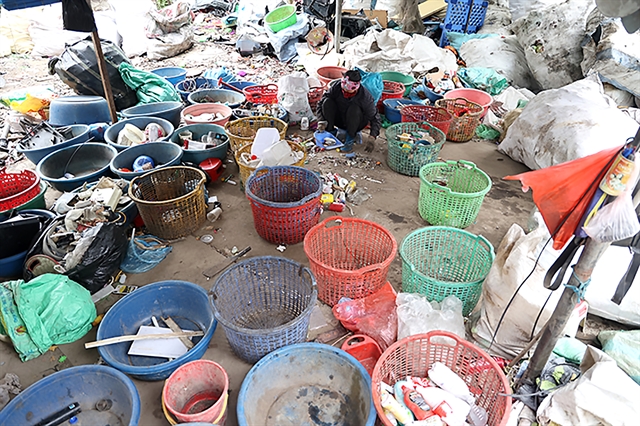 Society
Society


|
| A view of plastic waste, which is illegally dumped along roads in Ứng Hòa District in Hà Nội. — VNA/VNS Photo |
HÀ NỘI — Plastic waste recycling has brought a better life to thousands of people in the suburban area of Ứng Hòa District in Hà Nội, but has caused serious plastic pollution to the environment and affected people’s health.
Quảng Phú Cầu Commune used to be a craft village for black incense making. Due to the unstable income of incense making, many households in the village switched to collecting and disposing of plastic waste.
The new job has improved many villagers’ life, and the commune has become the largest plastic waste recycling area in the capital city. However, local people have suffered severe plastic pollution.
Lý Đinh Tuấn, a resident in Xà Cầu Village, said that there were many jobs available for people of all ages to earn money.
"In our village, only sick people can't make money. No matter how old or young, people can do it because the job is very simple,” he said.
“Strong people work with the plastic crusher or load and unload plastic goods while the elderly and even children classify, peel-off labels of bottles and clean them. They can earn at least VNĐ100,000 per day.”
Households in Xà Cầu Village take advantage of everything made of plastic. Frames of cars or motorbikes, cans, barrels, pots, bottles, water pipes, roofing sheets, or tiny plastic caps are collected, classified and recycled.
But things that can't be recycled are illegally dumped along the roads or burned to limit transportation costs, seriously affecting the lives of local people due to the burning smell of plastic.
In addition, people are also tortured by the noise of plastic crushers all day long. Hundreds of households live in a severely polluted environment with hundreds of tonnes of waste around the commune.

|
| Plastic waste is collected for recycling in Quảng Phú Cầu Commune in Ứng Hòa District in Hà Nội. — VNA/VNS Photo |
Lý Thế Hạnh, who has worked as a recycler for nearly 10 years, said: “Every day, I earn more than VNĐ200,000 (US$7.8). I can’t work in the rice fields due to the water pollution and rat and bugs.”
“There is no other job for me to do. Due to the daily exposure to the garbage and residual chemicals, many people in the village suffer from respiratory diseases or even cancers.”
Nguyễn Tiến Thi, another resident, said: “I have seen many people die from cancers although the job has been the main source of income for many residents. We hope local authorities will have solutions to ensure people's livelihood and health at the same time."
Trang Văn Viễn, vice chairman of Quảng Phú Cầu Commune’s People's Committee, said that about 180 households were doing plastic waste recycling.
Plastic waste was collected everywhere and brought back for recycling.
Viễn said Bắc Sơn Urban Joint Stock Company previously had signed a contract with the Commune People's Committee to collect and treat plastic waste. In early April, the job stopped collecting waste when the contract ended, causing a backlog of non-recyclable plastic waste of up to 150 tonnes.
Viễn said on the afternoon of April 22, the committee worked with the Department of Natural Resources and Environment of Ứng Hoà District and a representative of Hoà Bình Hi-tech Company to agree on a plan to treat non-recyclable plastic waste to address the situation.
According to Hà Nội’s Department of Natural Resources and Environment, about 4,000-5,000 tonnes of waste are discharged every day, about 80 tonnes of which are plastic. Only a small amount of plastic waste is incinerated, and most is buried directly in landfills or even discharged into rivers and seas.
Plastic waste is challenging to decompose and has a huge life span. — VNS




